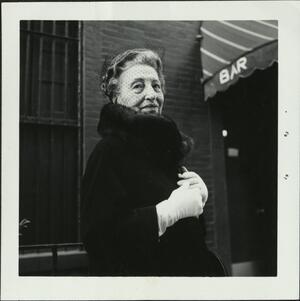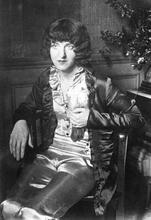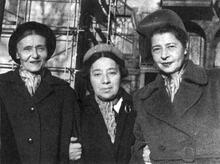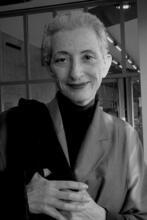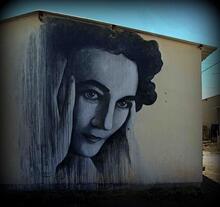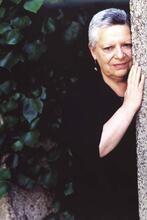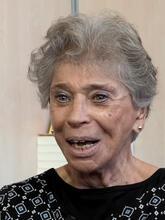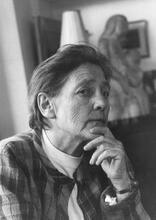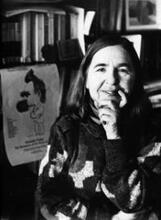Jean Starr Untermeyer
Jean Starr Untermeyer’s poetry career began when she married writer Louis Untermeyer. Her subsequent connections with writers Sara Teasdale, Amy Lowell, Carl Sandburg, and Robert Frost led her to write poetry. Her first two volumes of poetry were Growing Pains (1918) and Dreams out of Darkness (1921), and despite a string of devastating personal tragedies, Untermeyer continued writing. She published multiple volumes of poems, translated books and poems from French, German, and Hebrew, and taught at colleges. Untermeyer also joined W. H. Auden, Archibald MacLeish, and others on the board of the Poetry Guild and published her own memoirs. She wrote an essay defending a woman’s right to use personal experience in her art, and her own work is laced with motifs of betrayal and abandonment, love, death, and loss.
Overview and Early Life
Jean Starr Untermeyer’s memoir, Private Collection (1965), recalls a childhood blighted by “fear of the loss of love.” The fear and the loss—and the love—shadowed her life, but they illuminated her art.
The eldest of three children, born May 13, 1886, in Zanesville, Ohio, to Abram and Johanna (Schonfeld) Starr, she delighted in music, books, and the German spoken by her hardy immigrant grandparents. After their storm-delayed passage had depleted the family’s Term used for ritually untainted food according to the laws of Kashrut (Jewish dietary laws).kosher provisions, one pious grandmother had sewn a shroud and prepared to starve rather than eat traif. When land was finally sighted, the weakened but indomitable woman was carried onto American soil. For Jean, Germany was the enchanted land “Mamma came from.” However, advancing mental illness rendered her mother increasingly erratic and remote. Solace lay in her father, her piano, and (despite occasional antisemitic taunts in the schoolyard) her studies. She was sent to New York, where she attended Kohut College Preparatory School and took courses at Columbia University. In New York, on January 23, 1907, she married aspiring writer Louis Untermeyer; eleven months later, she bore a son, Richard.
Poetry Career and Personal Life
Jean Untermeyer envisioned a career as a lieder singer, but intimacy with writers—Sara Teasdale, Amy Lowell, Carl Sandburg, Robert Frost—led her to absorb poetry (as she put it) “by osmosis.” Hearing Edna St. Vincent Millay recite a new piece inspired her to begin writing poems. Her husband discovered them, submitted them to periodicals, and pressed for the publication of her first two volumes of poetry, Growing Pains (1918) and Dreams out of Darkness (1921).
Though music remained Untermeyer’s passion, her 1924 debuts in Vienna and London were discouraging, and more profound personal disappointments loomed. The Untermeyers returned to the United States at the end of 1924, enrolled their son at Yale, and spent the summer of 1925 at the MacDowell Colony. Also at MacDowell was a young woman Louis would marry the next year after obtaining a Mexican divorce. In January 1927, Louis and Jean’s son, Richard, hanged himself in his room at Yale.
Death is immutable; divorce is not. Indeed, Mexican divorces had only questionable validity in American courts and could be successfully contested by a nonconsenting partner. Jean, however, had not contested either the divorce or Louis’s marriage. When that second marriage ended, the Untermeyers reunited, adopted two boys, and moved to the Adirondacks. Unfortunately, the reconciliation failed and, because Jean was overwhelmed by the prospect of trying to raise two children by herself, Louis reluctantly accepted custody of the boys. He then obtained another Mexican divorce to marry a third wife, then yet another Mexican divorce to marry a fourth. When his third wife challenged in court the validity of the Mexican divorce that presumably dissolved her marriage (challenging, by implication, the validity of Louis’s latest marriage), Jean, hoping for yet another reconciliation, testified in favor of Louis: She asserted that she, the first wife, had not consented to any Mexican divorce—and her testimony allowed the court to rule the first marriage still in effect and all subsequent marriages invalid. In 1951, having abandoned all hope of reconciliation, Jean agreed to a Nevada divorce: Her marriage was finally over.
Later Works and Themes
Nevertheless, Untermeyer’s work continued. She had published a third volume of poems, Steep Ascent (1927), translated Oscar Bie’s Schubert, the Man (1928), and published a fourth volume of poems, The Wingèd Child (1936). She returned to the MacDowell Colony in 1938, in 1940 (when she published a fifth book of poems, Love and Need), and in 1941. At Yaddo in 1939, she met Hermann Broch; later she translated for publication his novel The Death of Virgil (1946). She published essays and book reviews, taught at Olivet College (1936–1937) and the New School for Social Research (1948–1951), and joined W. H. Auden, Archibald MacLeish, and others on the board of the Poetry Guild. She published her memoirs; a sixth volume of poems, Job’s Daughter (1967); and a volume of poems translated from French, German, and Hebrew, Re-Creations (1970).
Though she experimented, Untermeyer’s strongest poems are traditional in form; their subtle but complex harmonies—that inner movement of poetry she called “the fuel that feeds my fire”—reflect her passion for music. Her June 1923 Bookmark essay defended a woman’s right to use personal experience in her art, yet her poems are never confessional. Laced with motifs of betrayal and abandonment, they trace the struggle to renounce desire, transcend resentment, transmute suffering into insight. Her early work draws from nature, war, and closely observed domestic experience. Her later poems explore love, death, and loss, seeking regeneration through reflection and self-discipline, revealing, as Amy Lowell asserted, “the heart of a woman, naked and serious, beautiful and unashamed.”
Jean Starr Untermeyer died on July 27, 1970, in New York.
SELECTED WORKS BY JEAN STARR UNTERMEYER
A Bunch of Sweet Peas: Including Poetry, Prizes, Politics, Principles, Patriarchs, Puns, Personal Preferences, and A Few Cues [1949?].
Dreams out of Darkness (1921).
The Flowering of Lane Field (1933).
Growing Pains (1918).
Jean Starr Untermeyer Reading Her Poems at the City College of New York, March 28, 1941. Sound recording (1941. Copied 1953 for Archives of Recorded Poetry and Literature, Library of Congress).
Jean Starr Untermeyer Reading Her Poems, with Comment, at the Pathé Sound Studios, New York, N.Y.: January 5, 1961. Two sound cassettes (1961).
Job’s Daughter (1967).
Later Poems (1958).
Love and Need: Collected Poems, 1918–1940 (1940).
Poetry in a Prosaic World. Presented at Boston Jewish Book Week, Boston Public Library, December 22, 1940. Microform (1940).
Private Collection (1965).
Re-Creations (1970).
Steep Ascent (1927).
The Wingèd Child (1936).
Jean Starr Untermeyer wrote lyrics to the following music:
Adler, Samuel. The Passionate Sword: A Prayer for Baritone Solo, Flute, Clarinet, Violin, Cello, and Percussion (1979).
Bie, Oskar. Schubert, the Man. Translated by Jean Starr Untermeyer (1928).
Broch, Hermann. The Death of Virgil. Translated by Jean Starr Untermeyer (1995).
Hyson, Winifred. Song’s [sic] of Job’s Daughter: For Soprano with Piano Accompaniment (1983).
Leonhard, Rudolf. Christmas Song. Translated by Jean Starr Untermeyer (1939).
Read, Gardner. Lullaby for a Man-child: Medium Voice Op. 76, No. 1. Words by Jean Starr Untermeyer (1957).
BEOAJ.
Broch, Hermann. Papers and book collection. Hermann Broch Archive. Bienecke Rare Book Collection, Yale University Library, New Haven, Conn..
Dobbs, Jannine. “Jean Starr Untermeyer.” In American Women Writers: A Critical Reference Guide from Colonial Times to the Present in Four Volumes, edited by Lina Mainiero. Vol. 4 (1982).
EJ, s.v. “Untermeyer, Louis”.
Farano, Michel. Papers. University of Delaware Library, Newark.
Obituary. NYTimes, July 29, 1970, 39:2.
UJE.
Untermeyer, Jean Starr. Papers. Yale University Library, New Haven, and State University of New York Library at Buffalo.
Untermeyer, Louis. Bygones: The Recollections of Louis Untermeyer (1965), and From Another World: The Autobiography of Louis Untermeyer (1939), and These Times (1917).
Untermeyer, Richard Starr. By Richard Starr Untermeyer (1927).
WWIAJ (1926, 1928, 1938).
WWWIA 5, 7.

